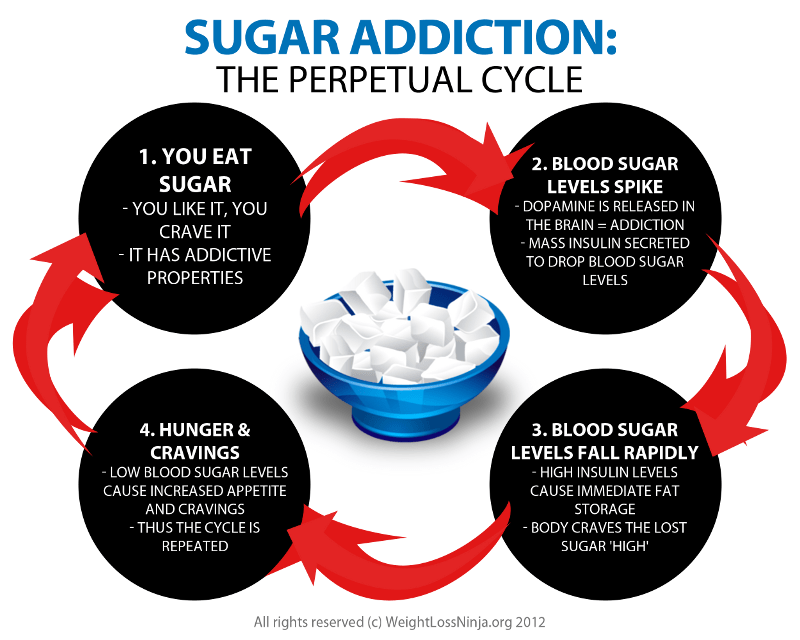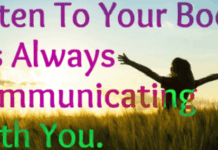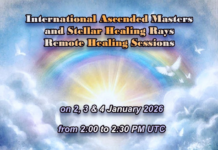
No matter what, you can’t seem to silence your sweet tooth. You always opt for dessert, even when your meal has left you stuffed. To you, anytime is snack time — and snack time is just another excuse to reach for something sugar-coated. If this sounds a lot like your relationship with sweets, you might have a sugar addiction.
Your relationship with sugar is like any other bad relationship. You probably know it’s bad, but you just can’t convince yourself to walk away. Maybe you can’t convince yourself you need to leave sugar for good, but the information in this article might.
Let’s look at the different types of sugar, why you’re so convinced you need sugar in your life, and, most importantly, how you can beat your sugar addiction once and for all and quit the bad habit for good.
How many kinds of sugar are there, really?
There’s a lot of confusion out there about the difference between carbohydrates and sugar. Let’s make it a little easier: sugar is a carbohydrate. Carbohydrates are what’s known as a macronutrient, alongside protein and fat. You get carbs from the foods you eat. Once you eat carbohydrates, your body breaks them down into energy — eventually, a molecule called glucose. (The term blood glucose, or blood sugar, refers to how much glucose is in your blood after you digest food.)
What makes this more complicated is that there is more than one type of carbohydrate. Different types of carbs behave differently in your body. The way they’re digested is completely different. Therefore, not all carbs are bad — and not all of them are good, either.
Let’s discuss the different types of carbohydrates and how your body breaks them down.
Sugar
When you see a section on a nutrition facts panel labeled “sugar,” this is the kind of carbohydrate it’s referring to. These are known as simple sugars or simple carbohydrates. They’re made up of one or two molecules of sugar, which makes them very easy to digest. Your body digests simple carbohydrates quickly, which releases large amounts of glucose into your bloodstream. This flood of glucose causes a sharp spike in your blood sugar. Eventually, in healthy individuals, insulin kicks in, and your blood sugar drops. Fruits and vegetables, as well as refined grains, processed foods and sweets, all contain simple sugars. Not all simple sugars are bad for you — but many are considered harmful.
Fiber
Fiber is what is known as a complex carbohydrate — it’s made up of many sugar molecules, making it harder to break down. Your body digests it very slowly, which means the uptake of glucose in your bloodstream is also much slower. This leads to a much smaller spike in blood sugar, which is one reason why high-fiber foods are so healthy. This is the type of carbohydrate you will find in fruits, vegetables, beans, dairy, and grains. The higher a food’s fiber content is, in general, the better that food is for you. However, this also depends on its other nutritional benefits, such as vitamins and minerals.
Starch
Like fiber, starch is also a complex carbohydrate that releases glucose into your bloodstream slowly. You’ll find starch in many vegetables and grains, as well as foods like beans, breads, and cereals. Starch is not bad for you if it comes in a food that’s highly nutritious. However, like simple sugars, if it’s present in a food that is otherwise unhealthy, it’s not going to do you much good.
What are added sugars?
Sometimes food manufacturers take the sugar from healthy foods and add it to foods during processing — thus, they become added sugars. Added sugars contain all the simple sugars found in fruits and vegetables and many other healthy foods — without the nutrition that comes along with those foods. This is why foods with added sugars — everything from candy to cookies to chips, syrups, and soft drinks — are so bad for you. They contain plenty of sweetness, but almost no nutrition whatsoever.
For the purposes of this article, when we refer to “sugar,” we’re talking about added sugars — the highly processed chemicals that do not occur naturally in foods. Do not fear foods that contain sugar naturally. In reasonable amounts, they will usually not cause harm the way processed sugars will.
Why you can’t stop eating sugar
If you suspect you have a sugar addiction, you’re most likely craving foods high in simple sugars and extremely low in other nutrients. Some of the most addicting foods in the world are loaded with added sugars and other synthetic, highly processed food additives. The science behind why it’s so easy to get hooked on sugar is complex, but if you’re at all familiar with addiction to any substance or activity, it’s not that foreign of a concept.
How addiction works
The different parts of your brain communicate through neurotransmitters, which travel between neurons to transmit different messages. According to the National Institute on Drug Abuse, many drugs interfere with this process, completely scrambling the brain’s normal communication systems. Sometimes, this ends up stimulating feelings of pleasure. If a drug ends up flooding your brain with dopamine, it tricks your brain into thinking you’ve consumed something nice. Your brain wants more of that nice thing — thus, you start craving more of it, even when you no longer want it.
This is an extremely simplified explanation of how drugs can mess with your head, but it’s all you need to know in order to understand why eating too much sugar is so dangerous.
Your brain on sugar
Sugar addiction isn’t much different than an addiction to any other substance. While sugar itself is not a drug in the traditional sense, it can act a lot like one. Drugs can essentially stimulate the overproduction of dopamine, which makes your brain feel good. Eating too much sugar also raises the levels of dopamine in your brain — and the same thing that happens when you take too many drugs happens when you overdo the sugar.
Source: http://www.healthfreedoms.org/sugar-addiction-why-it-happens-and-how-to-quit/
Disclaimer: We at Prepare for Change (PFC) bring you information that is not offered by the mainstream news, and therefore may seem controversial. The opinions, views, statements, and/or information we present are not necessarily promoted, endorsed, espoused, or agreed to by Prepare for Change, its leadership Council, members, those who work with PFC, or those who read its content. However, they are hopefully provocative. Please use discernment! Use logical thinking, your own intuition and your own connection with Source, Spirit and Natural Laws to help you determine what is true and what is not. By sharing information and seeding dialogue, it is our goal to raise consciousness and awareness of higher truths to free us from enslavement of the matrix in this material realm.
Português
 EN
EN FR
FR


























Myriam, as a nutritionist and healthfood-coach with 45 years of experience, how can you in good conscience be so misleading? You post a promise at the end of your title and then TOTALLY fail to follow through and provide what you promised your readers. How dishonest of you. As another reader already said, your “how to quit” part does not exist. You fail your readers and lose credibility.
Correct,Myriam
The ‘how to quit’ part is missing, could it be published please? This is probably the most interesting part of the whole article. Thanks
Before I respond to your very good question, Myriam “How to quit?” for indeed, it’s missing in this article, I need to make clear that I’ve written a response yesterday and lost it entirely, during posting. Or so it seems, for nothing showed up. It may happen that in a few days, two rather long responses will be present here. Count your blessings, ahem. I hope, lol. No advise with “how to” is present here, for I believe that each human being is a unique energy-system in itself, with individual needs and characteristics, above all, an inner voice that often needs a bit of encouragement to make itself heard.
A wisdom found within, by experience and discernment, is the most valuable travel-companion on
the road to one’s favorite local pub called “Horn of plenty” meaning our individual diet that serves us.
Besides, all succesful initiatives taken from within are empowering our autonomy, our ability to simply “know” the best possible choice, or path. Within healthy boundaries, based on grounding in trust and feeling safe. Not in a fixed state, but in a flexible state, ready for adjustment and change.
That’s not only related to our diet, but also to the ongoing changes happening within our inner and outer reality, anno 2017.
And now, to give you my view on sugar and “How to quit?” it’s possible to change your refined sugar intake, although I advise being gentle on yourself. Unless you’re geared for sudden change and coping with it adequately. To some it’s a solution in extreme conditions, but it’s highly recommended to know your digestion and body-language as a first step to tackle the sugar addiction and change your diet.
As a nutritionist and healthfood-coach with 45 years of experience I can offer you food for thoughts, pun intended, and share some of my experiences with sugar intake. The most dramatic effect in changing my sugar intake, was when I started a macrobiotic diet in 1973, followed this rather strict diet for about 2 years and chose mainly organic quality of food and drink. My vitality and health increased hugely, I ended my hippie-style life from day 1 and my sugar intake lowered drastically.
At some point I decided to follow my intuition in the choice of my food and not obey to a dogma or rule outside of me anymore. (I’m a minister’s daughter, experienced with the effects of dogma and external authorities). Using my experiences as wayshowers, open to change, trying things out and observe, in company of “the voice” of my digestive system and sense of wellbeing.
This experience of change for the better, sparked my interest in health and food and how it’s connected to our emotions, habits and ruts and not in the least…. social acceptance, belonging too. After all, isn’t it good to remember sitting at a table with family or friends, enjoying a good meal and feel content? Sharing it with others feeling the same contentment?
The second dramatic effect in changing my sugar intake is more recent. Since I moved overseas to the UK about 2 years ago, I indulged myself in the English sweet cakes, which are present almost at each gathering, social or creative, sold for charity purposes often too. Putting pressure on buying and eating them serves funding charities and to me this was part of finding my feet and connect with villagers.
My weight gained 6 kilogram and only 5 months ago I noticed this, standing on a weighing device. This wasn’t how I picture myself and I decided to stop eating sweet cakes, baking apple-pie at home and use
alternative sugars mainly. Also I began to use less sugar in my coffee, gradually, training my taste buds to a different level of sweetness. A slight sweetness serves me better now, instead of prominent sweetness.
Now the 6 kilogram have melted, they’re gone and I feel the melting is even going to continue. I feel so much better and more agile. In the 70’s, my twenties, I was a Twiggy! The craving for a sweet taste is still present, occasionally, but less prominent. I try to find alternative sugars, which are plenty, nowadays.
And to my surprise, a few weeks ago, I ordered a piece of carrot cake with my coffee, just to see how it went. For the first time I experienced nausea due to an overdose of sweet taste, after eating that large cake… with sweet cream on top instead of clotted cream, pure! That’s discouraging much, in a good way. The temptation is replaced by a sort of… indifference. So far my sugar-experiences, Myriam.
A short and most practical answer to your question “How to quit?” is “Quit” and skip thinking about the how and when first. The huge amount of reports, advise and suggestions, how to quit, shows how complicated quitting sugar is and the food industry loves it. Feeding sugar with one hand and offering remedies, diets and stomach-altering surgery or liposuction, the removal of tummy fat. That reminds me, physical excersize is very helpful in awakening and keeping one’s digestive system-stove burning in a good way. In fact, one’s whole body-functioning benefits, apart from breathing fresh clean air in nature and enjoy a relaxed state, grounded possibly with bare feet walking on grassland or a sandy beach.
By reading all the negative effects of refined sugar, one could easily become alarmed and come to conclusions and make choices, for a change in one’s diet, removing or replacing refined sugar by natural sources of a sweet taste. Alarm isn’t always the best condition to make a wise choice, for before we know it we land on the other side of the sugary spectrum by judging refined sugar as evil and fully ignore the craving for it that we experience inside.
As a baby, drinking our mother’s milk we enjoy a sweet taste, the first taste that is directly connected to our survival instinct, our need for comfort and safety. Refined sugar brings one back to one’s Self in an instant. A flash almost. It’s why noisy children calm down fast, happily licking a lolly. It’s why many adults too feel satisfied consuming food products or drinks with refined sugar. It’s given on a golden plate almost, one needs to be perceptive and study food-labels, nowadays. Even organic health-food shops sell many food-products with sugar cane in it, I’ve noticed with regret. That’s the commercial aspect of food-products and consumption, in the food-industry.
Paying attention to one’s body signs and digestive system, observing the effects of different sources of sweet taste, is a good start when a change of diet is welcome. Practical experience and allowing oneself an occasional treat that isn’t the wisest choice, but sooths one’s craving for sugar is at times better than denying one’s craving to be satisfied and become grumpy, sneaky, ready to sabotage one’s good intentions. Willpower and a sense of humour are good companions in this endeavour. Being naughty and allowing oneself to indulge, occasionally, isn’t a sin and that brings me to the last aspect in matters of diet: compassion with oneself and knowing that it’s love we’re coming from. For ourselves, to start with.
How does it feel to endure a bit of hunger, a craving for food? How does it feel to not eat in between meals? How does it feel to say “No, thank you” when an edible temptation is offered to you?
We may fool ourselves easily, making excuses regarding a food- and drink-choice. I now recall an expression I once read in someone’s home:
“When I eat carrots all day tomorrow, I’m allowed to enjoy this delicious bonbon now”
Excersizes with one’s diet and change of it is similar to excersizes on a bike, learning to ride it. Falling off is part of the learning process and not a failure. Training wheels can be the support of a friend or spouse, a holistic nutritionist who knows of the numerous aspects related to our daily food choice, our diet and not just the nutrients or commercial recommendations. Practice makes art. When we are gentle on ourselves with a change of diet, experimenting and finding out what works for us or not, there’s no need for judgment, harshness, forcing oneself to obey a strict regime, food-wise. And when a moment of weakness throws us off guard, we can always make a new choice and check in at our local pub called “Horn of Plenty”. It’s the location of our inner discernment, where abundance is awaiting us on the doorstep.
Peace be with you and with planet Earth. Blessed be and enjoy your next dinner! Marian Baghor.
Thanks Marian, I only asked for it because it was in the title and it seemed important to reveal how to quit indeed for those who might have been facing this challenge for a long time, like I have. I agree with you that rule #1 should be to be gentle with ourselves, and also that individuals operate along different modes. But I feel that the most important aspect of this addiction is the acceptance of it; only with awareness of the situation are we able to move forward to look for solutions. And indeed there is no need for shame or guilt or any other feelings around the addiction: it simply is what it is.
In my experience once I accepted the fact I was able to move past the various emotions attached to it and start looking for solutions that suited who I am. So I got rid of sugar gradually to the point that I got rid of the cravings (most of the time that is); one thing I decided was to ban sugars during the week and allow myself a treat at w/e for respecting the covenant. The less sweet I eat/drink the lesser the cravings but at times it raises its head. So my next question was to wonder the why of it? And to observe in which circumstances do I suddenly crave for sugar? So I am able to pinpoint the emotions that trigger the cravings, look at them and resolve the issues. But I found that it never truly go away, it’s like a program that is running soundlessly in the background, when the right emotions emerge they seem to trigger the right sensors and bang, automatic response: sugar, sugar. Blessed be you too dear Marian